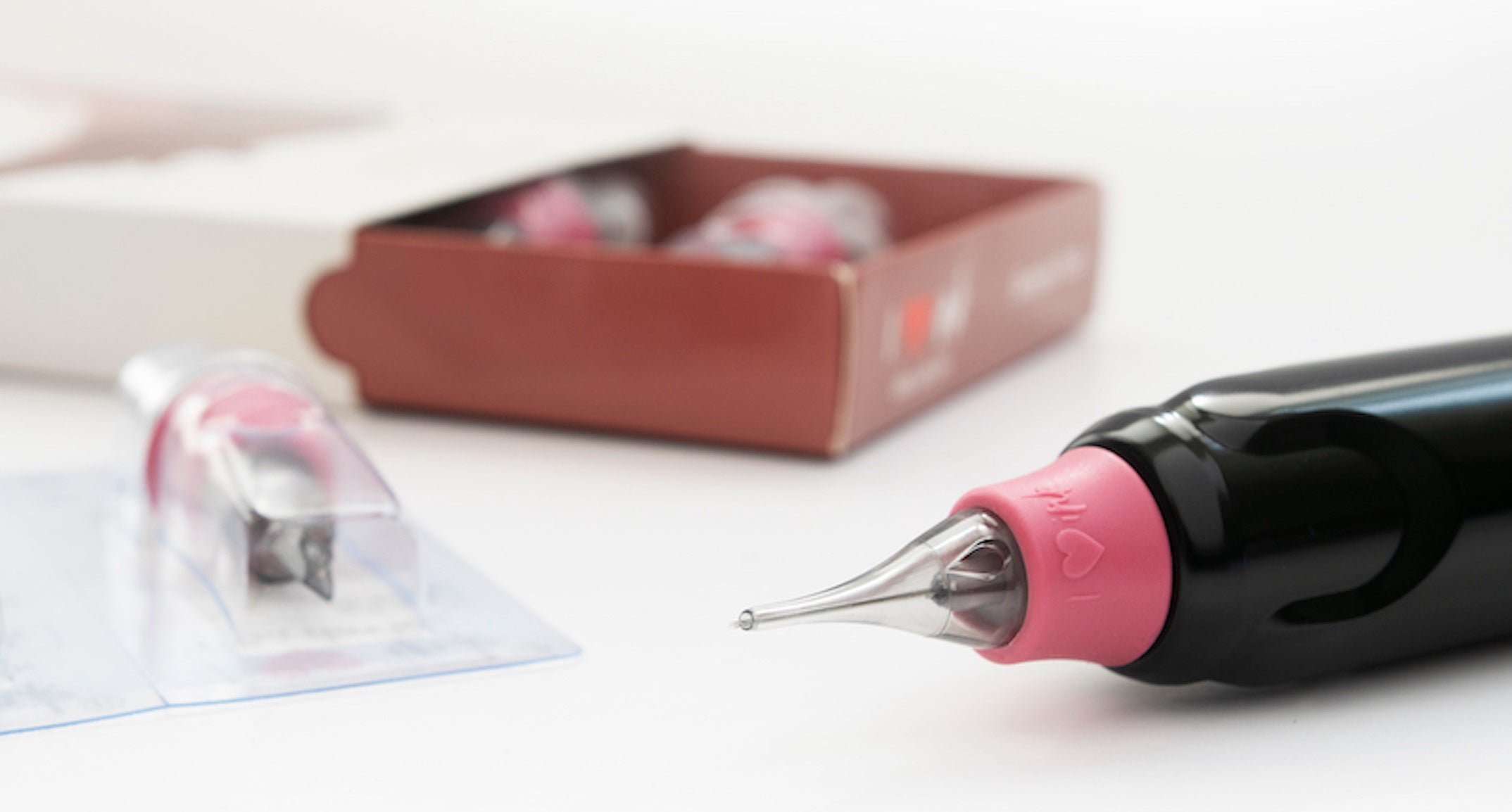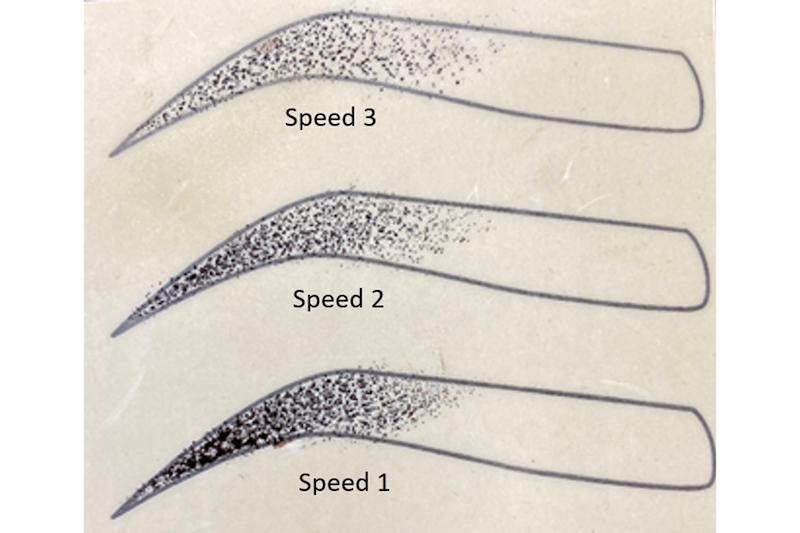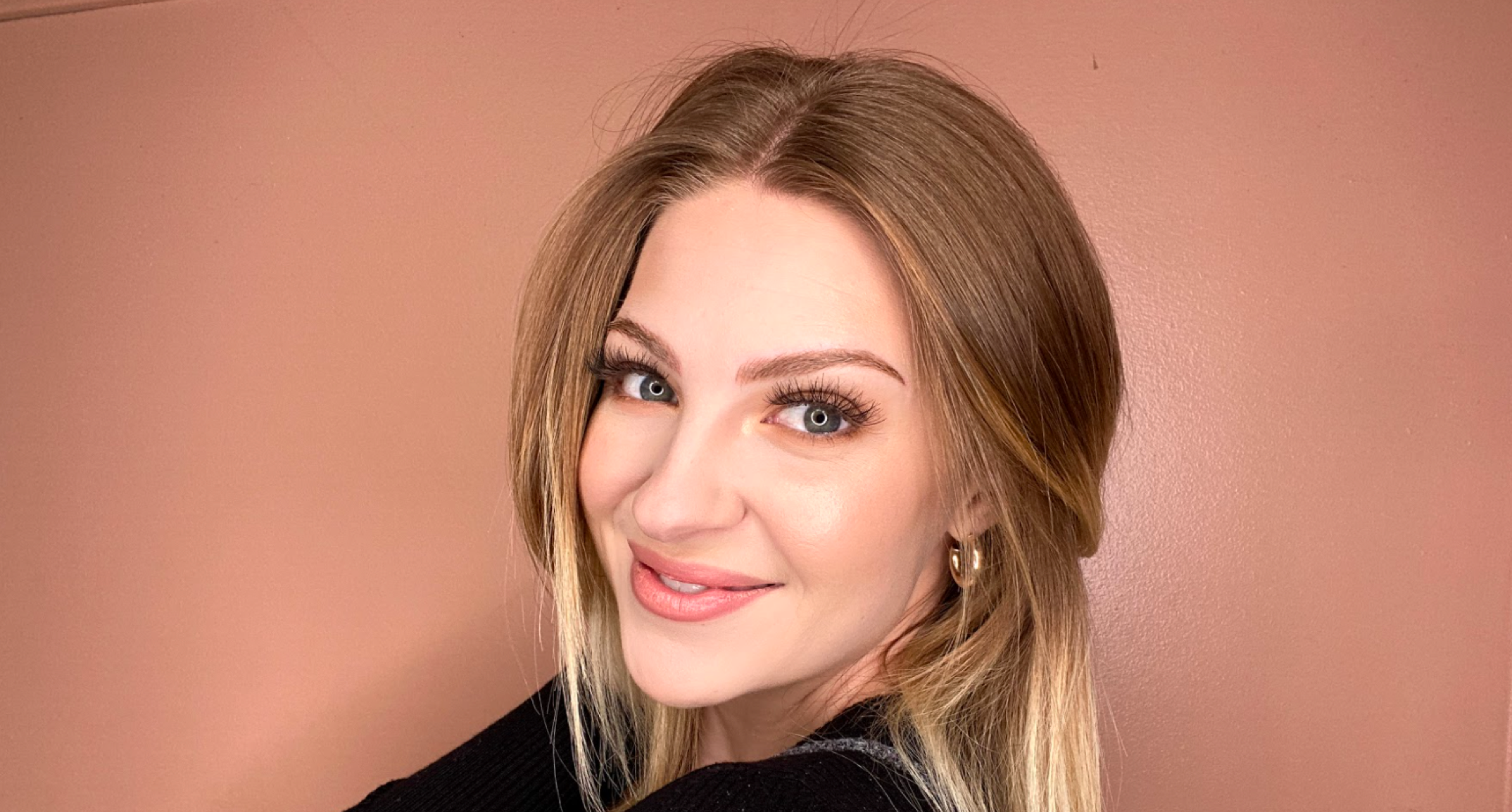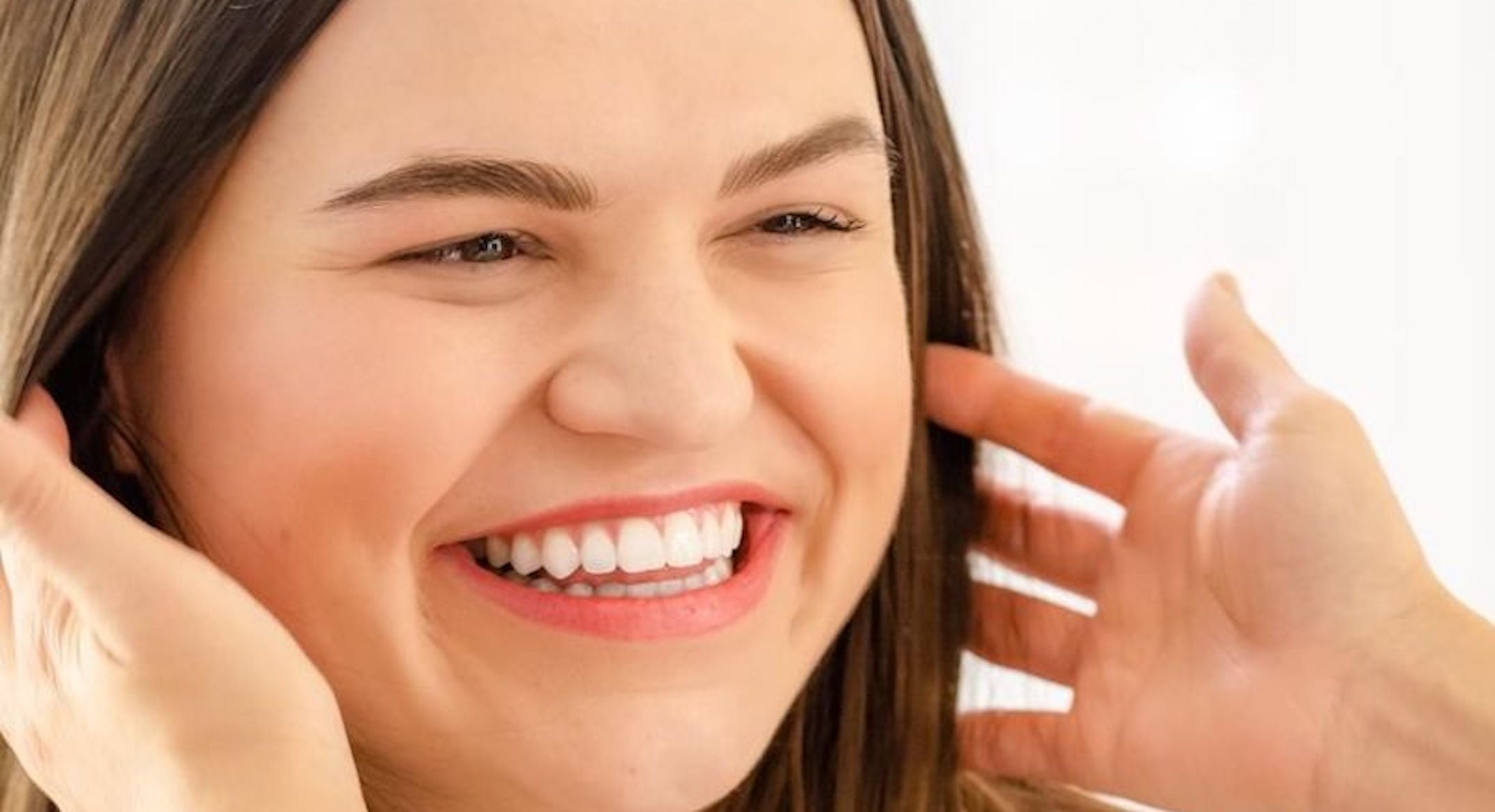
Introducing I❤️INK Precision Needle Cartridges

We are entering into the Golden Age of PMU.
With the onset of better products, education and inks that truly last the test of time, PMU is finally getting the attention and recognition it deserves. The word is quickly spreading about what we as artists have known all along: waking up with makeup is truly life-changing. Look no further than to celebrities such as Adele, Janet Jackson, Gwyneth Paltrow, and Huda Kattan to see who else is embracing PMU as the “must-have makeup of the future”.
Demand is rising and so are client expectations. Passionate artists who strive to be the best are constantly working towards elevating their skills so they can delight their clients and give them the freedom and confidence that PMU uniquely brings. There’s just nothing like waking up in the morning with perfect brows, lips, or eyeliner!
Now, artists are transitioning away from PMU devices that were underperforming, too expensive, and tied to proprietary cartridges, to universal needle cartridges that fit the more accessible, high-performing and affordable “rotary machines” which body tattoo artists have used for years. Finally, we started to level the playing field and use what the pros have been using all along to get those transformational results that keep their schedules full and clients coming back for more.
But…..the universal cartridge options and sizes were endless and confusing at the same time!

I started hoarding dozens of universal cartridge options - trying out so many, looking for the right size, taper, needle tip….it was all very overwhelming with soooo many sizes and limited guidance that a PMU artist could easily understand. Needless to say, this was all so hard to navigate and they just didn’t suit my needs as a PMU artist.
I wanted to change this for artists so during research and development, I listened carefully to the artist community and their struggles with needle selection, consistent outcomes, and comfort. Honing in on improving outcomes, I developed the most sharp and precise needles you will ever use - introducing the I LOVE INK PRECISION NEEDLES.
Made to fit rotary-style machines, our needles are sharp, easy-to-use, and allow you to deliver the best results each and every time. The brush-like needles are flexible, yet gentle, providing maximum ink deposit with minimum skin trauma.
To allow for precise, detailed work of a PMU artist, the elongated tip allows for a perfect line of sight so you can see EXACTLY where the tip of your needle is touching the skin.
I also focused on the ergonomics to allow the fingers to grip right onto the cartridge so artists could use a whipping, sweeping or pendulum motion with ease vs. having to grip onto the bulky part of the machine. The soft, silicone finger ledge will provide you with the enhanced finger control, added comfort and help to reduce hand fatigue. In addition, there’s a patented full safety membrane that prevents backflow, keeping you and your clients safe.

 8 sizes to suit your PMU needs
8 sizes to suit your PMU needs
Tattooing is an artistic craft and the needle size choices often come down to personal preference. Choosing the size of a needle is all about the design, skin type and the skin quality you’re working with.
In general, smaller needle sizes such as the 1RL are suitable for high-detail and pixelated pigment deposit. Larger sizes such as the 3RL and 5RS will provide more coverage. Finally, the largest sizes such as the 7CM and 9CM will provide the most coverage, but without detail.
You can use more than one needle size to suit your design needs. We are seeing artists starting to use a variety of needle groupings to complete their work more efficiently with less “needle time in skin”. This is important as one of the keys to great results and pigment retention is MINIMAL TRAUMA. We all wish for our PMU designs to heal the way we intended, without loss of definition and so much colour.
Think of needles as your brushes with unlimited ways to execute beautiful designs. You are only limited by your imagination!

Machine combination brows: 1RL to create the fine hairstrokes + 5RS/7CM/9CM to add shading behind the hairstrokes.
Machine and microblade combination brows: U or curved microblade to create the fine hairstrokes + 5RS/7CM/9CM to add shading behind the hairstrokes.
Powder brows: 1RL to create the front pixelation and along the edges + 3RS/5RS/7CM to add shading to the body of the brow.
Powder brows: 1RL to for the entire eyebrow + 3RS to add a more defined lower edge to the brow.
Classic eyeliner: For a medium to thicker eyeliner, 3RL or 5RS to fill the lash line, then 1RL for the edges and the wing.
Shaded eyeliner: 1RL for the edges and the wing + 3RL/5RS to fill the lash line.
Lips: 1RL to create the outline + 3RS/5RS/7CM/9CM to fill the inside.
Areola: 1RL and 3RL to create the details such as wrinkles and Montgomery Glands + 3RS/5RS/7CM/9CM for the inside and soft edges.

Needle suitability chart
Explore your art and create new designs by trying our Sampler Pack that contains a variety of all our needles, click here.

Sampler Pack with 10 various sizes
Check out the beautiful work created by some of our amazing Pro Artists using our cartridges.

Anita Abramo @cosmetic_tattooing_ottawa, Eyeliner - .25 1RL and 3RL

Ramona Krusinskiene @mona_permanent_cosmetics, Lips - .25 1RL

Paula Fitzpatrick @paulafitzpatrick_pmu, Brows -.30 1RL

Mini Ha @minibrow_ Eyeliner - .30 1RL

Anita Abramo @cosmetic_tattooing_ottawa, Eyeliner - .25 1RL and 9CM

Elaine Campin @elainecampinelitebrows, Lips - .25 1RL

Jill Höyer, @jillhoyer, Eyebrows - 9CM and .25 1RL

Paula Fitzpatrick, Areola - .25 1RL, .25 3RL, 9CM
FAQ's
What machines are the needles compatible with?These needles are compatible with ROTARY TATTOO machines that accept UNIVERSAL CARTRIDGES such as: Axys Vahalla, Xion, Xion S, Flux, Bishop, Bellar, Rook Quill, Mast Tour, Mast Magi, Omnia, Flux, Dragonhawk, Bronc and more.

Will these needles work in proprietary PMU machines/devices?
No, they will not work with PMU devices such as: Slay Bae, Boujee, Black Pearl, 24K, Artmex, Phibrow, Biomaser, Amiea, Infinity, Biotek, Nouveau Contour, and other proprietary PMU devices.
*If you’re unsure, reach out to your manufacturer for clarification.
I’m worried about cross contamination and backflow. How is this prevented?
We use a patented and fully secure membrane system that prevents backflow and cross contamination of fluids into your machine.

The needles are constructed from medical grade 304 stainless steel.
How many cartridges are in a box?
There are 10 needle cartridges per box.
What are the corresponding tattoo needle size numbers that represent needle diameter?
.25mm = size 08
.30mm = size 10
.35mm = size 12
How are the needles sterilized? Is there a sterilization certificate?
Our needles are sterilized by EO Gas. The blister pack has a sterilization indicator that changes from red to blue once sterilized. For your convenience and compliance to local health inspection standards, we’ve included proof of sterilization certificates that you can download from our website here.
Technical
What is “taper” and why is this important?The taper is the length of the needle tip. It can be measured by the reduction in diameter from the widest point of the needle diameter to the thinnest point - the tip.

- Short taper = 2mm
- Medium taper = 3.5mm
- Long taper = 6.5mm
- Extra-long taper = 8mm
A short taper is going to leave a larger hole in the skin and will deliver more pigment than a medium or long taper. Although a short taper delivers more pigment, it can cause more trauma in the skin.
A long taper will leave a smaller hole in the skin and will deliver less pigment than a short or medium taper. Although a long taper delivers less pigment, it will cause less trauma in the skin.
In addition, a longer tapered needle allows an artist to have more control over how the ink is put into the skin. The refined distribution of ink allows the artist to build up layers and create a smoother blend.
Do the cartridges have small or larger cartridge tips and how does that factor affect pigment deposit?
A factor that affects pigment deposit is how the needle tip of the cartridge hugs around the needle itself. Our cartridges have small/tighter cartridge tips to give more stability, precision and better pigment flow. This also prevents “wiggle” of the needle within the tip itself.

Tip of 1RL needle

Tip of 7CM needle
What is the difference between a liner needle and a shader needle?
Round liners and round shaders are pretty straightforward - shader needle groupings are spaced further apart than liner needle groupings. Tightly packed liners such as a 3RL or 5RL are used for making super-fine lines and precise designs whereas shader needles such as the 3RS or 5RS are spaced further apart to deposit softer colour/shaded effects.

What are magnum needles and how do I use them?
Magnums deliver more colour into the skin at one time due to the larger grouping of needles. Because of this, you’ll need less passes over an area which in turn means less damage to the skin.They can be used 2 ways - forward and back or side to side.There are three types of magnum configurations - curved, weaved, stacked and. Each delivers different results based on the way the needles are arranged.

Image courtesy of Jill Höyer from The Collective’s Inside Needle Knowledge Course
Curved/CM magnum needles are arranged in two rows, with more space between each needle, and shaped like an arc with recessed corners. They are also known as soft magnums or soft edge magnums are the go-to for high coverage shading work. While tattooing, the recessed corners prevent the look of hard edges (like an eyeshadow brush) and snagging the skin. We carry the 7 CM and 9 CM needles.
Weaved magnum needles are arranged as two rows of needles with more space between the needles. They do not have recessed corners. Weaved Magnums are not packed tightly so there is a small amount of space between the needles like shown above. This spacing allows more coverage while tattooing and the ability to hold more ink.
Stacked magnum needles are arranged as two rows with less space between the needles and squared corners. They do not have recessed corners. The arrangement of tight needles can cause skin trauma very easily, so use stacked magnums carefully. Machine speed must be kept slow so that the needle will not strike the skin too many times, and use forward movements because of the squared corners. They are not a curved configuration.
Here's Jill Höyer doing her signature powder brow with a 7CM. Guess how long it takes her to do brows with a mag? Only 30 minutes!
What machine speed do you recommend?
Machine speed and hand speed are two related variables along with the artist’s technique that controls the results. The machine speed determines the frequency of needle patterns or dots touching the skin. The hand speed determines the distance between needle patterns or dots in the skin. This is an important and extensive topic that requires in-depth understanding and hands-on experience. Check out our course - Inside Needle Knowledge by Jill Höyer to learn more here.

Image courtesy of Ombré Brows online
What technique shall I use with these needles?
You can use lining, pointillism, whip shading, pendulum and sweeping movements with these needles. Think of your needles like a brush, with your work only limited by your imagination! The options are endless. Most importantly, always work off the tips of the needles and use a smooth, consistent movement. Do not bury the needle into the skin and remember to implement a nice, taut stretch AT ALL TIMES to ensure direct deposit into the skin. It’s like putting on liquid eyeliner - if the skin is not flat, you will have an uneven, dotted line.
Is it important to keep my needle clean during the procedure? How do I clean it?
Yes, it is very important to keep your needle clean and free of ink buildup so it doesn’t get clogged up and block smooth ink flow and impair visibility from a clogged needle head. You can clean your needle tips by running and dipping them into a cup of sterile water kept at your station or by constantly wiping them into cotton/gauze.
How far should the needle protrude/stick out from the tip?
The needle should protrude 2-3 millimeters (about the width of a dime) from the tip to enable you to see the tip of the needle clearly. This is called “needle hang”.

Remember, when tattooing, you should only be working off the tip(s) of the needle, not pressing the needle into the skin.
What role does the skin have in my needle choice and outcomes?
Your client’s skin type and texture will highly dictate your overall result. As you work on different
skin types, you’ll start to understand what happens when you use different needle types along with skin variables.
Smaller needle configurations penetrate the skin more easily than larger configurations, so adjusting your working pressure on thin versus thick skin is important. Also, when the skin is thinner, you’ll need to back off on your pressure and passes in order not to injure or scar the skin.
The colour is not going in? What am I doing wrong?
Firstly, make sure you run the machine and let the ink “draw up” into the tip. Before the needle hits the skin, make sure there is ink at the tip otherwise you will be tattooing with a dry needle. Be sure to always stretch the skin taut so it’s nice and flat, that way your needle doesn’t just bounce off the skin, voiding deposit.
My client healed and there is no colour/inconsistent colour, what am I doing wrong?
Colour retention problems can be caused by either artist and client factors. Some artist factors include poor technique such as a lack of a taut stretch, lack of consistent hand movement, lack of consistent needle depth or not tattooing into the dermis level of the skin. Client factors include excessive bleeding, uneven surface (large pores or scarring), or poor aftercare such as excessive trauma, lack of hygiene, or lack of proper care to the skin during healing. Oftentimes, it can be hard to determine the exact reason but slowing down, and re-doing the procedure with focus on improvements to your technique will usually bring better outcomes along with enhanced client aftercare.
Do you have a course that can teach me how to understand needles and use them with confidence?
Yes, we offer a very comprehensive needle class by Jill Höyer called Inside Needle Knowledge that teaches the guiding principles behind needle choices such as size, taper, speed, angle and depth along with case studies. Once mastered, you will be able to confidently understand, distinguish and make needle choices to fit your personal style of artistry and client skin type. Find out more here.








Leave a comment
This site is protected by hCaptcha and the hCaptcha Privacy Policy and Terms of Service apply.